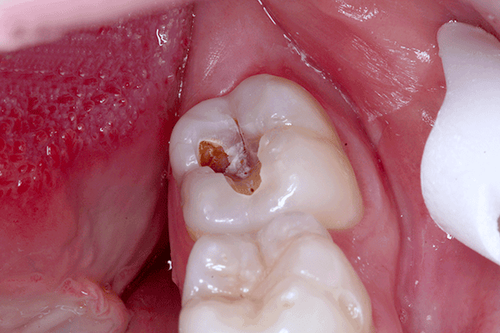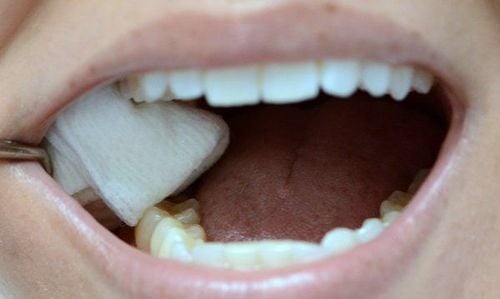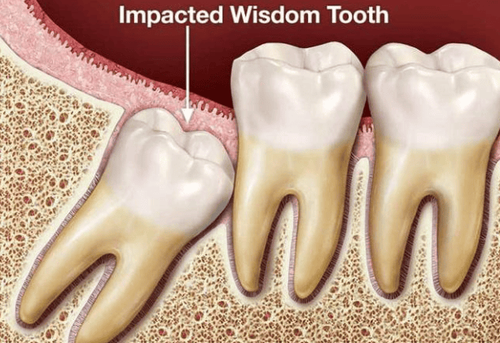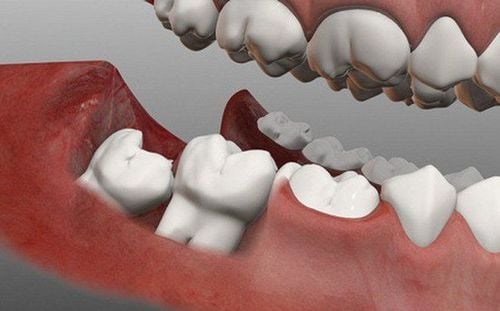This is an automatically translated article.
Wisdom teeth often grow to one side, get stuck, push the adjacent teeth... causing pain and discomfort for you. Therefore, wisdom tooth extraction is necessary in some cases. So what happens when wisdom teeth are removed? The following article will provide you with the necessary information about wisdom tooth extraction.
1. Why is it necessary to remove wisdom teeth?
The eruption of wisdom teeth marks you as an adult because it usually appears when you are between the ages of 17 and 21. It is the third molar and has the same role as other teeth.
Tooth extraction is a common procedure in dentistry. However, the removal of wisdom teeth is not simple if they have not yet erupted. Wisdom teeth grow in four places, at the top and bottom of the back of your mouth. As a result, they can grow sideways, only partially, or get stuck, leading to pain, infection, swelling of the gums and face... When any of these conditions arise, your dentist will consider and determine whether wisdom tooth extraction is necessary.
In some cases, to prevent potential problems of the wisdom teeth from affecting in the future, some dentists still recommend wisdom teeth extraction even if the impacted teeth are not currently in trouble.
Wisdom teeth are indicated by dentists to be extracted in the following cases:
Wisdom teeth that grow in the wrong position can create conditions for food to be trapped, giving bacteria that cause tooth decay the opportunity to develop. repeated or severe gum infections; Wisdom teeth grow too far and damage cheeks or gums; You need surgery to move your jaw forward or backward; Partially misaligned wisdom teeth can allow bacteria to enter the gums and create infection. This can also lead to pain, swelling and stiffness in the jaw; Some people voluntarily ask for wisdom teeth to be extracted because they think it will crowd or damage neighboring teeth; Impacted wisdom teeth can form cysts on or near the impacted teeth. This can damage the roots of adjacent teeth or destroy the supporting bone; Caries .

Sâu răng là một trong các nguyên nhân cần nhổ răng khôn
2. What happens when wisdom teeth are removed?
2.1. During wisdom tooth extraction
Dentists have previously determined whether to remove wisdom teeth by examination. Before wisdom tooth extraction, the dentist will numb the area (freeze) the area to be extracted. General anesthesia may be used if multiple wisdom teeth need to be removed at once. A general anesthetic helps block pain throughout the entire body and will keep you asleep during the surgery. Your dentist may ask you not to eat or drink the night before surgery.
To remove a wisdom tooth, the dentist will open up the gum tissue over the tooth and remove any bone covering it. The doctor will separate the tissue that connects the tooth to the bone and then remove the tooth. Sometimes the dentist will cut the tooth into smaller pieces to make it easier to remove.
After the tooth is removed, you may need stitches. Some stitches will disappear on their own with time and some must be removed after a few days. Your dentist will let you know if the stitches need to be sutured. Bite firmly on a cotton swab placed on the wound to help stop the bleeding.
2.2. During recovery from wisdom tooth extraction In most cases, the recovery period lasts only a few days. To relieve pain and discomfort, over-the-counter medications such as Acetaminophen or Ibuprofen can be used. Your dental surgeon can prescribe pain medication, if needed. Antibiotics may also be prescribed before the procedure to clear up any infection around the wisdom teeth.
After tooth extraction, it is important to continue taking the medicine to prevent further infection. The following tips will help speed up your recovery:
Bite the gauze periodically and change the gauze as they absorb blood. Call your dentist or surgeon if you are still bleeding 24 hours after surgery; When your mouth is numb, be careful not to bite the inside of your cheek or lips or tongue; Do not lie flat because this position can prolong bleeding time; Try using an ice pack on the outside of your cheek. Use continuously for 15 to 20 minutes at a time for the first 24 hours. You can use moist heat (such as a washcloth soaked in warm water) for 2 or 3 days afterward; Physical activity is not recommended because it can increase bleeding; Eat soft foods, thin soups or porridge. Gradually add solid foods to your diet as the healing process progresses; Use of straws should be strictly limited for the first few days. Sucking on a straw can loosen blood clots and slow wound healing; After 24 hours, gargle gently with warm salt water several times a day to reduce swelling and pain. Absolutely do not smoke for at least the first day after surgery. Sucking can loosen blood clots and slow healing. In addition, smoking reduces the blood supply and can bring germs and contaminants to the surgical area; Avoid rubbing the area with your tongue or touching it with your fingers; Continue to brush your teeth and tongue carefully.

Sau nhổ răng khôn bạn cần cắn nhẹ vào miếng gạc theo hướng dẫn của Nha sĩ
2.3. What are the possible risks of wisdom tooth removal
What are the risks of wisdom tooth extraction or the risks of complications associated with wisdom tooth extraction? often worries a lot of people. Generally, in people over 35 years of age, the complications associated with wisdom tooth extraction are greater than in younger people. People over 50 who face tooth extraction have a higher risk of complications because the bone fuses with the teeth as we age.
After wisdom tooth extraction, you may experience the following conditions:
Pain and swelling in the gums and socket where the tooth was extracted; Bleeding that doesn't stop for about 24 hours; Difficult or painful opening of the jaw; Slow-healing gums; A painful inflammatory condition known as dry fossa, which occurs if the protective blood clot is lost too soon; Numbness of the mouth and lips after the medication wears off, due to trauma or inflammation of the maxillary nerve. Rare side effects, including:
Numbness in the mouth or lips that does not go away; Jaw fracture if the tooth is firmly attached to the jawbone; An opening into the sinus when the wisdom tooth is extracted from the upper jaw; Dental surgery can cause bacteria in the mouth to enter the bloodstream and cause infections in other parts of the body; Anesthesia (local or total) is almost always used during tooth extraction. All surgeries using general anesthesia carry a small risk of death or other complications.
3. What if wisdom teeth are not extracted?
Some people have a mentality of “what if wisdom teeth are not extracted” even though it causes discomfort. Where impacted wisdom teeth are not extracted, the following can happen:
Tooth displacement: Affected wisdom teeth can shift surrounding teeth, causing an uneven and painful bite. Bone loss and jaw enlargement: Affected wisdom teeth can play a role in bone loss and jaw expansion. Congestion: Wisdom teeth can contribute to sinus congestion and headaches. Cysts and Tumors: Impacted wisdom teeth can be a factor in the development of tumors or cysts that destroy bone, including cyst formation in surrounding gum tissue. Gum tissue irritation: Gum tissue around impacted wisdom teeth tends to be more prone to gum irritation. If the wisdom teeth do not come in completely and are crooked, it can become difficult to clean the gums. Periodontal pockets, tooth decay and bone loss: Difficult to clean gums easily causes debris to stick, creating the perfect environment for bacteria. As a result, bacteria can create periodontal pockets, cavities, and lead to bone loss. Orthodontic changes and dentures: For children, wisdom teeth can adversely affect orthodontic results. For the elderly, wisdom teeth can reduce the function of dentures. In a nutshell, wisdom teeth can be displaced to one side, partially erupt, or become stuck leading to pain, infection, swollen gums, etc. When any of these conditions arise, you should see your dentist. to consider and determine if wisdom tooth extraction is necessary or not.
To examine and treat dental problems, you can go to the Department of Odonto-Stomatology - Vinmec International General Hospital. Currently, Vinmec is one of the leading prestigious hospitals in the country, trusted by a large number of patients for medical examination and treatment. Not only the physical system, modern equipment: 6 ultrasound rooms; 4 DR X-ray rooms (1 full-axis, 1 intensifier, 1 synthesizer and 1 mammogram); 2 portable X-ray machines DR; 2 multi-row computer tomography rooms with receivers (1 128 rows and 1 16 rows); 2 rooms for magnetic resonance imaging (1 machine 3 Tesla and 1 machine 1.5 Tesla); 1 room for 2 levels of interventional angiography and 1 room to measure bone mineral density.... Vinmec is also the place where a team of experienced doctors and nurses will gather a lot of support in diagnosis and detection. early signs of abnormality in the patient's body. In particular, with the space designed according to 5-star hotel standards, Vinmec ensures to bring the patient the most comfort, friendliness and peace of mind.
Please dial HOTLINE for more information or register for an appointment HERE. Download MyVinmec app to make appointments faster and to manage your bookings easily.
References: healthlinkbc.ca, yourdentistryguide.com, mouthhealthy.org













